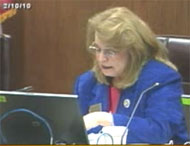2/17/2010
Arizona Senate Panel Approves Photo Ticketing ExpansionArizona Senate committee approves vendor-sponsored legislation to expand photo radar in the guise of reform.

The Arizona Senate Public Safety and Human Services Committee approved legislation last Wednesday that would substantially expand the size and scope of the photo enforcement program in the state. Lawmakers voted 6-1 to approve legislation allowing the use of automated ticketing machines for a number of new types of violations. Committee Chairman Linda Gray (R-Phoenix) sponsored the legislation after becoming an enthusiastic supporter of cameras.
"I have come to understand with the data that has come in photo radar has provided for safer highways," Gray said. "So I have a different perspective today than when I first learned of what photo radar is doing."
Although Gray introduced the legislation claiming it would "reform" the photo enforcement program, the measure was in fact drafted by Redflex Traffic Systems, a firm based in Australia. The company listened to lawmaker complaints and included some mild changes that would not affect the company's existing practice, such as a change in the signage requirements. The legislation also included a number of items of direct financial interest to the company.
"We appreciate senator Gray for working with us," Redflex lobbyist Mike Williams said. "We've worked with legislators for the past three years."
Under the current program, for example, a vehicle must be accused of traveling 11 MPH above the speed limit before Redflex can mail a photo citation. The Redflex legislation eliminates this buffer and allows the issuance of tickets for driving as little as 1 MPH over the limit in either a school zone or highway work zone. Signage requirements are gutted by a provision that allows photo radar warning signs to be left up for up to 24 hours when no photo radar is in use. The bill also eliminates the requirement that photo tickets be issued only for speed and red light violations, opening up the possibility that such tickets could be issued for cell phone and other violations. The initial draft of the legislation specifically included language that would allow Redflex to issue tickets to motorists accused of having lapsed insurance or vehicle registration.
Existing law gives photo enforcement companies sixty days to properly serve notice on a photo ticket recipient. The bill would double this to 120 days to address the fact that 73 percent of Arizona ticket recipients refuse to pay. The public's widespread opposition to the program created the grassroots group CameraFraud.com which is circulating a referendum petition that would ban cameras throughout the state.
"It's probably going on the ballot," Williams said. "My understanding is they're very active in gathering signatures."
To combat the initiative, the committee also adopted a Redflex-sponsored measure, SCR1059, which would place the exact legislative language already adopted by the committee in SB1443 on the ballot.
"It mirrors what we just voted on -- why do we need it?" state Senator Al Melvin (R-Tucson) asked. "It will be a ballot measure in competition with getting rid of them completely. It sounds like the electorate could be confused."
Senators Melvin and Sylvia Allen (R-Snowflake) voted against SCR1059. A copy of the legislation is available in a 40k PDF file at the source link below.
Update: State Representative Frank R. Antenori (R-Tucson) issued a statement suggesting he was deceived by the lobbying effort on this legislation.
"In the case of SB1443, I was led to believe that the bill set guidelines for city, county and state use of photo radar and was a bill to significantly limit their use, not expand them," Antenori wrote. "As I had time to review the full text of bill, I came to realize that I was not presented with all of the provisions contained in the bill... The bill does in fact expand the use of photo radar for the purpose of issuing citations for other infractions besides speeding. Therefore I am pulling my support from this bill and will actively work to defeat it in the State House of Representatives."


